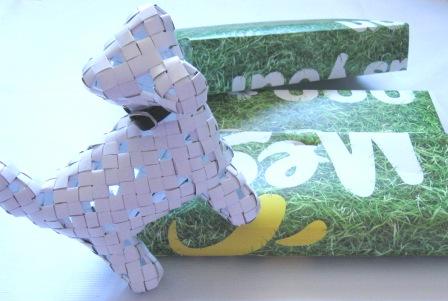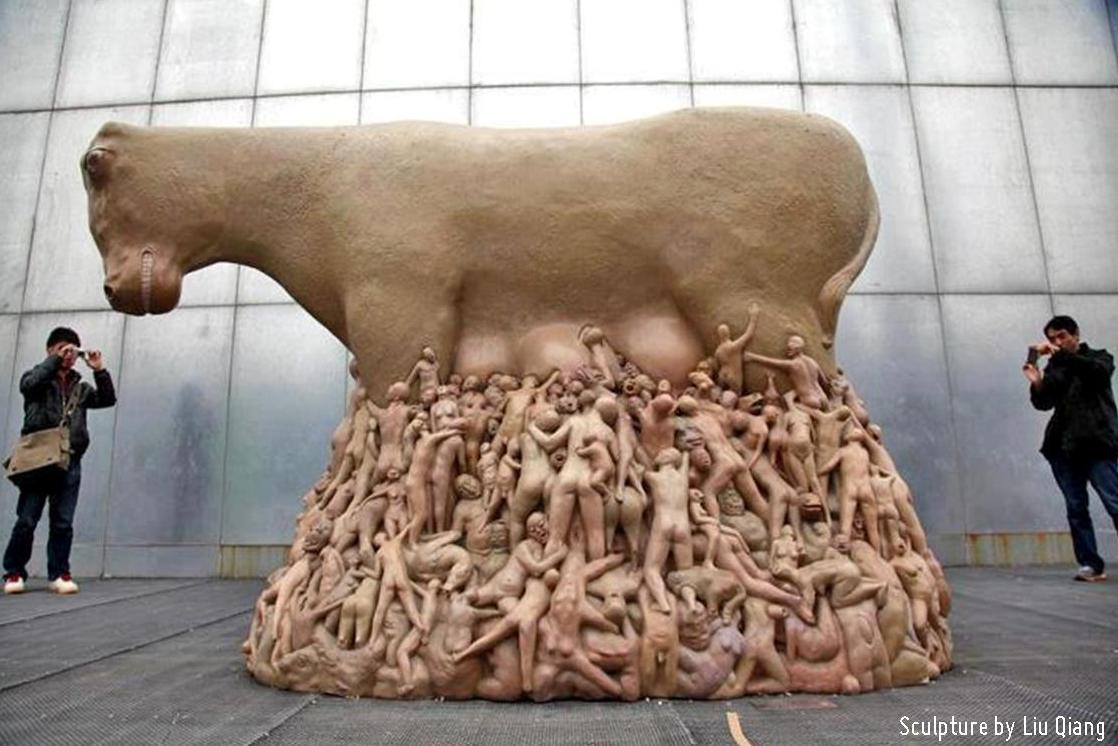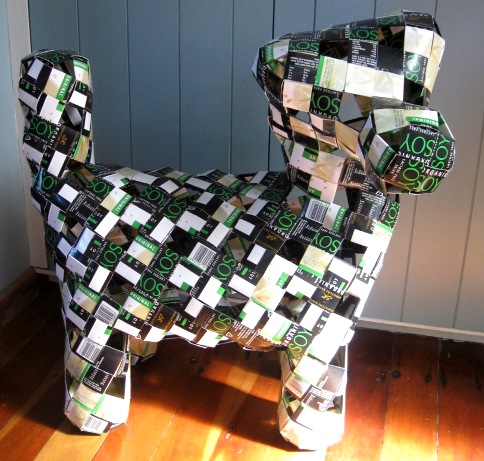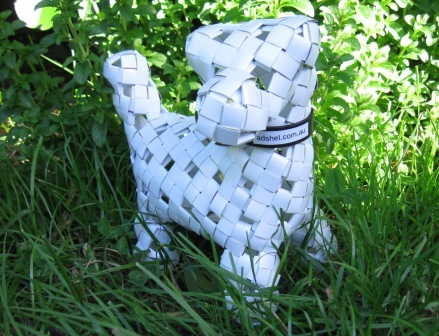Despite what the ads might imply, milk is not made by feeding grass to cows. It is made by making them pregnant, over and
over
again and each time after giving birth, their babies are taken away to either be butchered or treated as a commodity.
The work to restore our rivers and aquifers will take years but the cruelty can be stopped without doing a single thing.
It merely requires that certain products not be purchased. It's a peaceful way to protest that packs far more of a punch.

Adshel kindly commissioned us to recycle hundreds of posters into satchels, to feature their many clients at a
conference in Australia. In doing so, it was
noted that a certain
NZ dairy brand had an ironic logo.
This isn't about them - it's about the dairy industry as a whole.
It's a cruel manipulation of motherhood that affords it no respect or reverance.
WARNING: The following is utterly offensive to viewers of any age:
The dairy worker prosecuted for his actions in the video wasn't working in a silo. It is in a culture where that type of
cavalier attitude towards animals goes on everyday, up and down the country. It's a culture in which sentient beings
are turned into commodities. Cows are such gentle, trusting souls and look at how we treat them:
What kind of a person separates mothers from their babies as a career choice?
Cows cry out for one another on
being separated - who is hearing
their cries and reasoning that they are doing
the mothers a favour by making
off
with
their newborn's breast
milk at 4.31am? Who is breeding them to favour
such an uncomfortable
increase
in the
size
of
their udders,
that
it's necessary for them to seek help at 4.31am?
What we are
doing
to animals
is not
something to be proud of as a NZ export.
Needing a job does not justify it either:
Synthetic milk can't hit the shelves soon enough. That's where the future is and NZ isn't.
Rewind 25 years to find ample wool farmers in tears and out of business due to the introduction of synthetic fibres.
It is also unethical and short-sighted to limit a calf from accessing its mother's most nutritious colostrum form of
milk which
lasts 3-4 days after giving birth. Colostrum is "high octane" milk and it's produced by all mammals (meaning us too) in the late
stage of pregnancy.
It's full
of antibodies and immunoglobulins, to afford newborns protection from bacteria
and viruses.
For Fonterra to market it overseas for sale to wealthy Chinese (who are likely to be government cronies) and Americans,
(who
are not exactly in need of a high fat dietary supplement) is perverse as the animals,
soon to enter
the food chain, then
require
antibiotics and steroids to keep them "healthy". In addition, it is questionable if there are any independent studies
with proof that
it offers any health benefits to adult humans, making it a bit like sipping on antler tea or shark fin soup.
Even if there were such studies, it would be a safe evolutionary bet that human colostrum milk would be the better match.
And then what?
Click here to see TVNZ award Fonterra's Marketing Manager, Gillian Munnik as marketer of the year in 2009 for
her
team's "innovative" campaign to market colostrum milk. TVNZ should be ashamed and Munnik as a woman, even more so.

See here to read the New Zealand Vet Associations, Fonterra funded encouragement to remain the world's No.1 supplier of
colostrum milk. Fairly sure they did not intend this document to be in the public domain but thanks to the internet, it is.
See here to read an NBR article covering other Kiwis involved and the push to export colostrum milk that started in 2008.
If you don't want to support what's going, it's easy enough to ditch milk, butter and ice-cream given
all
the dairy-free
alternatives.
Plus, what's so tasty about a
random mother's breast milk in your cuppa?
As for
chocolate, cheese and
yoghurts - there's a gaping gap in
the market
for cruelty-free affordable options.

If you don't like that soy or rice milk comes in Tetra-Pak containers, you can now buy it in the chilled milk section in
standard
plastic milk
containers. Or have a go at using the Tetra-Pak's to make something fun with your children.
Our Tetra-Pak dog used
up 56 containers, minus the top and bottom sections. That's a lot of milk containers to save/rescue but
if you
remove
the ends, they can be easily washed and flat packed down, to store away until you've got enough to get crafty.
That said,
in Australia and many other countries there are industrial recycling facilities for Tetra-Pak containers...

We are super grateful to Adshel for their support. We want to do the
right
thing by them
and their
clients, to encourage as much recycling as possible, so
the dog is being trained to behave.
The thing is, so are the cows, their calves, the penned in pigs and the cooped up chickens.
Their welfare is far more important than recycling and if we don't say something, then we're a part of the problem.
There are other career paths for those who own land, enjoy working outdoors and love being their own boss.
Let's
help farmers by sharing cruelty-free ideas for their talents... and by thinking carefully about what we spend our money on.
Nothing creates change faster in a capitalist
society
than customers that aren't buying what they are being sold.
Every drop of breast milk has a past and a calf it was intended for. By not using it in the present,
we can limit the
future profits of those who think money is more precious than motherhood.